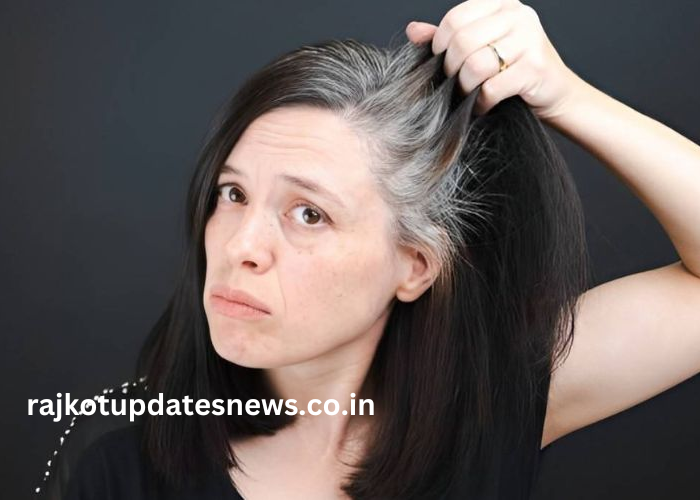
The appearance of white or gray hair is a natural part of aging, but many people wish to delay or prevent this process. Factors such as genetics, lifestyle choices, and environmental influences can accelerate the graying of hair. Understanding how to maintain your hair’s natural color is crucial for those looking to keep a youthful appearance.
Wellhealthorganic.com: white hair easy ways to prevent it naturally offers a comprehensive look into natural methods for preventing white hair.
In this article, we will explore various strategies, dietary adjustments, and lifestyle changes that can help you maintain your hair’s natural color.
From the role of vitamins and minerals to the impact of stress and pollution, we will cover all aspects necessary for effective hair care.
Key Points
- Natural methods can significantly slow down the graying process.
- A balanced diet rich in specific vitamins can enhance hair health.
- Stress management techniques are crucial for maintaining hair color.
What Causes Hair to Turn White or Gray?
Understanding the causes of white or gray hair can provide insight into prevention strategies. Here are some key factors:
- Genetics: Your family history plays a significant role in when you may begin to gray.
- Melanin Production: Hair color is determined by melanin, and its production decreases with age.
- Nutritional Deficiencies: Lack of essential nutrients can accelerate the graying process.
- Stress: Chronic stress can affect hair pigmentation.
By identifying the underlying causes, you can take steps to mitigate them.
How Does Diet Affect Hair Color?
Nutrition plays a critical role in maintaining your natural hair color. Here’s how diet impacts hair pigmentation:
- Vitamins and Minerals: Essential nutrients like B vitamins, iron, and zinc are crucial for hair health.
- Antioxidants: Foods rich in antioxidants can protect hair follicles from oxidative stress.
- Healthy Fats: Omega-3 fatty acids nourish hair, helping maintain its color and texture.
Incorporating nutrient-dense foods into your diet can promote healthier hair.
What Foods Are Best for Preventing White Hair?
Certain foods can help in preventing white hair due to their nutritional content. Here’s a list of beneficial foods:
| Food Item | Key Nutrients |
| Spinach | Iron, Vitamin A |
| Nuts | Vitamin E, Zinc |
| Eggs | Protein, Biotin |
| Fish | Omega-3 Fatty Acids |
| Berries | Antioxidants |
Incorporating these foods into your meals can help support hair health and pigmentation.
How Can Herbal Remedies Help Prevent White Hair?
Herbs have been used for centuries to promote hair health. Here are some effective options:
- Amla (Indian Gooseberry): Rich in vitamin C and antioxidants, amla can enhance pigmentation and promote hair growth.
- Bhringraj: Known as a rejuvenating herb, bhringraj can help in restoring natural hair color and improving scalp health.
- Hibiscus: This flower is known to nourish hair and prevent premature graying.
Note: Incorporate these herbs into your hair care routine for maximum benefit.
What Lifestyle Changes Can Help Prevent White Hair?
Making lifestyle changes can significantly impact your hair health. Consider the following:
- Stress Management: Techniques such as yoga, meditation, and mindfulness can help reduce stress, which may slow down graying.
- Regular Exercise: Physical activity improves blood circulation, promoting healthier hair growth.
- Adequate Sleep: Sleep is crucial for overall health, including hair health. Aim for 7-9 hours per night.
These lifestyle adjustments can contribute to maintaining your natural hair color.
How Important Is Hydration for Hair Health?
Hydration is vital for overall well-being, including hair health. Here’s how staying hydrated helps:
- Moisture Retention: Proper hydration ensures your hair remains moisturized, preventing dryness and brittleness.
- Nutrient Transport: Water aids in the transport of nutrients to hair follicles, supporting their function.
- Scalp Health: A well-hydrated scalp is less prone to issues like dryness and dandruff.
Note: Aim to drink at least 8 glasses of water daily for optimal hydration.
What Role Do Stress and Mental Health Play in Hair Graying?
Mental health has a direct connection to physical health, including hair pigmentation. Here’s how:
- Cortisol Production: High-stress levels can lead to elevated cortisol, which can affect hair follicles and pigmentation.
- Behavioral Changes: Stress may lead to unhealthy habits like poor diet and lack of sleep, exacerbating hair issues.
- Emotional Well-being: Maintaining emotional health through hobbies and social connections can support overall health.
Addressing mental health is essential for maintaining your natural hair color.
How Does Smoking Affect Hair Color?
Smoking is a known factor that can accelerate aging, including the graying of hair. Here’s how:
- Reduced Blood Flow: Smoking constricts blood vessels, limiting oxygen and nutrient supply to hair follicles.
- Oxidative Stress: The chemicals in cigarettes can cause oxidative damage to hair, leading to premature graying.
- Nutritional Deficiencies: Smokers often have lower levels of vitamins and minerals essential for hair health.
Quitting smoking can have numerous benefits for your hair and overall health.
Can Hair Care Products Impact Hair Color?
The products you use on your hair can influence its health and color. Here’s what to consider:
- Chemical Ingredients: Avoid harsh chemicals, such as sulfates and parabens, which can damage hair.
- Natural Alternatives: Opt for natural hair care products that contain nourishing ingredients.
- Heat Protection: Using heat protectants can minimize damage from styling tools, preserving hair health.
Note: Choose hair care products wisely to promote long-term health and color retention.
How Often Should You Wash Your Hair?
Washing frequency can affect hair health and color. Here’s a guideline:
- Oily Hair: If you have oily hair, washing it every other day may be necessary.
- Dry Hair: For dry hair types, washing once or twice a week is often sufficient.
- Normal Hair: A wash every 2-3 days usually works well for normal hair.
Adjusting your washing routine can help maintain hair’s natural oils and color.
What Are the Benefits of Scalp Massage?
Scalp massages are beneficial for hair health in several ways:
- Improved Circulation: Massaging the scalp increases blood flow, promoting nutrient delivery to hair follicles.
- Stress Relief: This practice can also reduce stress, which indirectly benefits hair pigmentation.
- Enhanced Absorption: Applying oils or treatments while massaging can improve absorption and efficacy.
Consider incorporating regular scalp massages into your hair care routine.
How Can Essential Oils Help Prevent White Hair?
Essential oils can be powerful allies in your quest for healthier hair. Here are some effective options:
- Rosemary Oil: Known to stimulate hair growth and enhance pigmentation.
- Coconut Oil: Provides deep nourishment and can improve overall hair health.
- Peppermint Oil: Increases circulation to the scalp, promoting healthier hair.
Note: Always dilute essential oils with a carrier oil before applying to your scalp.
Is There a Connection Between Age and Hair Color?
Aging is the most significant factor in hair color change. Here’s what happens:
- Decreased Melanin Production: As you age, melanin production decreases, leading to gray or white hair.
- Genetic Factors: Your genetic makeup determines when and how much gray hair you will have.
- Environmental Stressors: Over time, exposure to pollutants and UV rays can affect hair color.
While age is inevitable, understanding its effects can help you prepare for and manage changes.
How to Choose the Right Hair Care Routine?
Creating an effective hair care routine is essential for maintaining your hair color. Here’s a simple framework:
- Identify Your Hair Type: Determine if your hair is oily, dry, or normal to tailor your routine.
- Use Quality Products: Invest in shampoos and conditioners that cater to your hair type and color.
- Regular Treatments: Incorporate treatments like masks and oils to nourish and protect your hair.
A personalized hair care routine can help you maintain your natural color and overall hair health.
How Can Lifestyle Factors Affect Hair Graying?
Various lifestyle factors can contribute to premature graying. Consider these influences:
- Dietary Choices: Poor nutrition can lead to deficiencies that accelerate graying.
- Physical Activity: Regular exercise supports overall health and can benefit hair.
- Sleep Quality: Inadequate sleep can exacerbate stress and affect hair pigmentation.
By making positive lifestyle changes, you can help preserve your natural hair color.
Conclusion
In summary, wellhealthorganic.com: white hair easy ways to prevent it naturally provides valuable insights into the natural prevention of white hair. By understanding the causes, incorporating beneficial foods, managing stress, and choosing the right products, you can significantly slow down the graying process. Embrace these strategies to maintain your natural hair color and promote overall hair health. Remember, small, consistent changes can lead to significant results over time.
FAQ’s
1. What causes hair to turn white or gray?
Genetics, aging, and nutritional deficiencies can all contribute to hair losing its pigment.
2. How can diet influence hair color?
A diet rich in vitamins and minerals can support melanin production and overall hair health.
3. Are there specific foods to prevent white hair?
Yes, foods like spinach, nuts, and berries are beneficial for maintaining hair color.
4. How do herbal remedies help prevent white hair?
Herbs like amla and bhringraj nourish the scalp and hair, promoting pigmentation.
5. What lifestyle changes can help?
Managing stress, exercising regularly, and getting adequate sleep can help prevent white hair.
6. How important is hydration for hair health?
Hydration is crucial as it supports nutrient transport and moisture retention in hair.
7. Can smoking cause premature graying?
Yes, smoking restricts blood flow and introduces harmful chemicals that can affect hair color.
8. How often should I wash my hair?
Washing frequency depends on hair type; oily hair may require more frequent washing than dry hair.
9. What are the benefits of essential oils for hair?
Essential oils can nourish the scalp and improve circulation, promoting healthier hair.
10. How can I create an effective hair care routine?
Identify your hair type and use appropriate products and treatments tailored to your needs.


